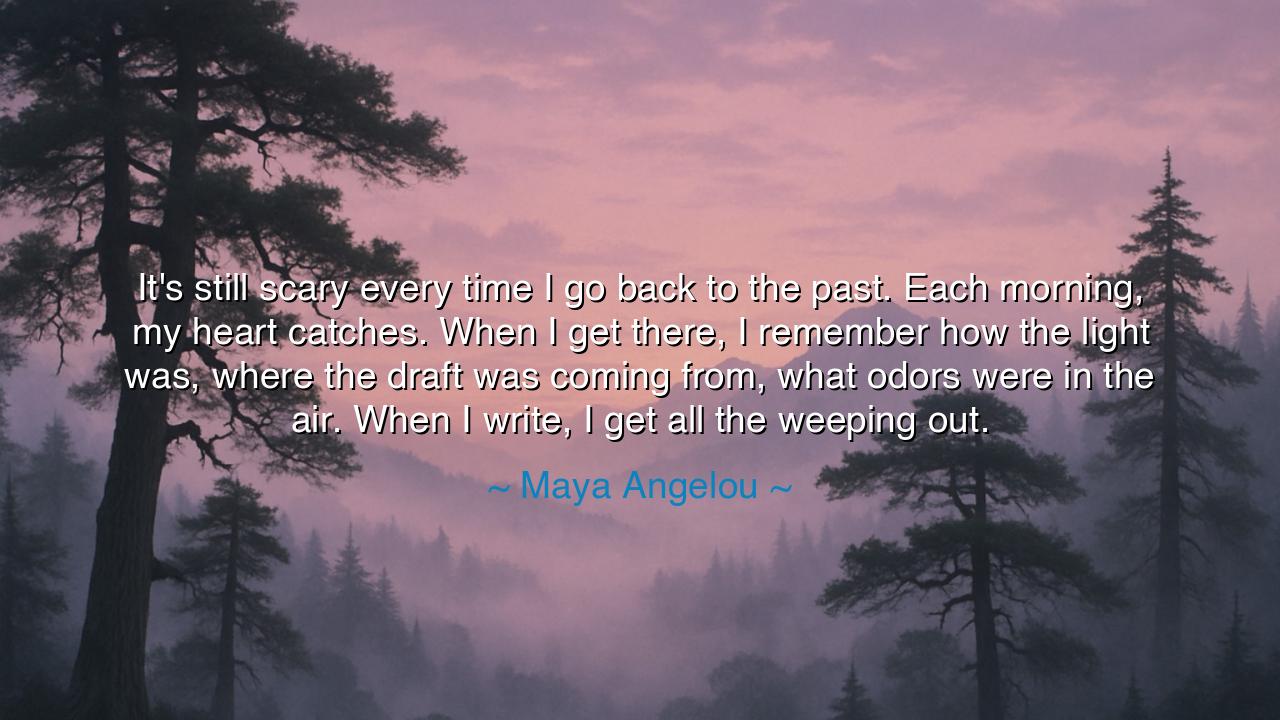
It's still scary every time I go back to the past. Each morning
It's still scary every time I go back to the past. Each morning, my heart catches. When I get there, I remember how the light was, where the draft was coming from, what odors were in the air. When I write, I get all the weeping out.






Children, gather close and listen to a story of memory, courage, and the power of expression. In the words of the great Maya Angelou, we hear a reflection on the profound and often painful act of revisiting the past: "It's still scary every time I go back to the past. Each morning, my heart catches. When I get there, I remember how the light was, where the draft was coming from, what odors were in the air. When I write, I get all the weeping out." These words, though deeply personal, carry a universal truth—the way that our memories shape us, and how revisiting the past, though painful, can be a path to healing.
Angelou’s words remind us that the past is never truly behind us, but remains alive in our hearts and minds, waiting to be remembered, often unexpectedly, when we least expect it. Memory is not just an abstract concept, but something that lives and breathes within us—alive in the sights, the sounds, the smells, and the feelings that we carry from the moments that shaped us. When Angelou writes, she doesn’t just recall facts—she relives the past, feeling its essence as if it were happening in real time. Her writing becomes a way to purge the emotions, to let out the grief and pain that have long been held inside, finding release in the act of putting those feelings into words.
Think, children, of the ancient poets and bards, who carried the memories of their people within them. These poets didn’t just tell stories—they relived the events, the triumphs, and the sorrows of their ancestors. Homer, in his Iliad and Odyssey, painted pictures of grief and joy, of heroes and battles, but his words were not just a recounting of events—they were an act of reliving and feeling the history of his people. Angelou’s writing is no different. It is an attempt to understand the past, to honor it, and to heal from it. Just as Homer’s words were both a tribute and a release, so too does Angelou’s writing help her process the complexities of her own story.
Consider, children, the story of Odysseus, who, though yearning to return home, had to first confront the ghosts of his past before he could truly heal. The gods, in their wisdom, guided him through challenges, each one forcing him to relive certain aspects of his past life and his journey. These trials were not just external, but internal, requiring Odysseus to confront his own choices and griefs. Just as he had to face his past to find peace, Angelou’s writing is her way of confronting what has been buried, of going back to understand the light and the drafts, the odors and the sorrows, so that she can move forward. The past, though painful, holds the keys to understanding and healing—and only through facing it can we find peace.
The lesson here, children, is one of the healing power of memory and expression. Angelou’s courage to return to the past every day, to relive the light and the draft and the odors, teaches us that we cannot move forward without first understanding and releasing the weight of what we have carried within us. Writing, for Angelou, becomes a form of purification, a way to let go of the tears that have built up inside over time. But her words also teach us that we all have a responsibility to face our pasts—not to stay in them, but to acknowledge them, to feel them, and to release the pain in a way that frees our hearts.
In the same way, think of the great warriors of old, who, before they could move forward in battle, had to first lay to rest the ghosts of their past battles. Alexander the Great, in his pursuit of glory, carried with him the weight of his own fears, his own doubts, and the emotional scars of past conflicts. Only when he understood his inner struggles and confronted his griefs could he fully rise to the challenges ahead. Like Alexander, Angelou’s path to peace was not found in forgetting the past, but in facing it, embracing it, and allowing it to shape her future in a healthy way.
So, children, the true strength lies not in avoiding the past, but in embracing it, understanding it, and using it to build a stronger, wiser future. Angelou’s act of writing is not just a release of her own pain, but a call to each of us to honor our own stories, our own struggles. Do not fear the past, for it is in confronting it that you will find your greatest strength. When you feel the weight of sorrow or grief, do not bottle it up; instead, find a way to express it, to release it, just as Angelou did with her words. Writing, speaking, and sharing can all become the tools by which you cleanse your soul, find peace, and move forward on your path with greater wisdom.






AAdministratorAdministrator
Welcome, honored guests. Please leave a comment, we will respond soon